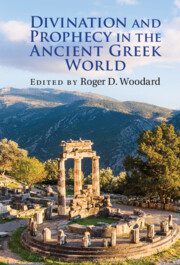Book contents
- Divination and Prophecy in the Ancient Greek World
- Divination and Prophecy in the Ancient Greek World
- Copyright page
- Contents
- Contributors
- Acknowledgments
- Abbreviations
- General Introduction
- 1 Greek Divination as the Transformation of an Indo-European Process
- 2 On Divinatory Practices and la raison des signes in Classical Greece
- 3 Oracle and Client
- 4 Oracular Failure in Ancient Greek Culture
- 5 The Dynamism of Mouvance in the Pronouncements of the Delphic Oracle
- 6 Decentralising Delphi: Predictive Oracles, Local Knowledge and Social Memory
- 7 Oracular Tales before Historiography
- 8 Omens and Portents Foretelling Victory and Defeat: Ontological, Literary, and Cognitive Perspectives
- 9 The Use of Divination by Macedonian Kings
- 10 False Prophets and Fake Prophecies in Lucian
- 11 Afterword
- Bibliography
- Index
1 - Greek Divination as the Transformation of an Indo-European Process
Published online by Cambridge University Press: 22 December 2022
- Divination and Prophecy in the Ancient Greek World
- Divination and Prophecy in the Ancient Greek World
- Copyright page
- Contents
- Contributors
- Acknowledgments
- Abbreviations
- General Introduction
- 1 Greek Divination as the Transformation of an Indo-European Process
- 2 On Divinatory Practices and la raison des signes in Classical Greece
- 3 Oracle and Client
- 4 Oracular Failure in Ancient Greek Culture
- 5 The Dynamism of Mouvance in the Pronouncements of the Delphic Oracle
- 6 Decentralising Delphi: Predictive Oracles, Local Knowledge and Social Memory
- 7 Oracular Tales before Historiography
- 8 Omens and Portents Foretelling Victory and Defeat: Ontological, Literary, and Cognitive Perspectives
- 9 The Use of Divination by Macedonian Kings
- 10 False Prophets and Fake Prophecies in Lucian
- 11 Afterword
- Bibliography
- Index
Summary
The title of this chapter is an adaptation of the title of an important book about linguistic structures and processes of early Indo-European as they experienced transformed expression in the evolved, and evolving, linguistic structures of ancient Greek.1 Like that work, this study is concerned with the diachronic and synchronic intersection of structures. But while that work chiefly and expansively addresses morpho-phonological matters of dialect development, this one is a much more modest lexical study (a set of fairly fine-grained lexical analyses) of specific elements of Greek divination, one that finds particular inspiration in Benveniste’s (1969) Le vocabulaire des institutions indo-européennes. What follows is a study of linguistic and cultural structures in which I hypothesize (1) that deliberate intellectual or cognitive engagement is the expected response to the production of Greek prophetic signs and (2) that this state of affairs continues, at least in part, idealized practices of ancestral Indo-European cult. Given that the idea that oracles are puzzles in search of a solution is fundamental to the ancient literary presentation of Greek divination, the first half of this hypothesis may appear trivial; however, what I hope to show is that intellectual engagement with an oracle is a cult act of a more “requisite” nature and attitude than perhaps typically imagined – it is the religiously right response – and that this is so (part two of the hypothesis) for reasons having to do with inherited religious structures (the appearance of the forest may not be substantially changed, but some new understanding of the trees may possibly present itself). I begin with Roman Jakobson, a master analyst of linguistic and cultural structures.
Keywords
- Type
- Chapter
- Information
- Divination and Prophecy in the Ancient Greek World , pp. 13 - 49Publisher: Cambridge University PressPrint publication year: 2023

